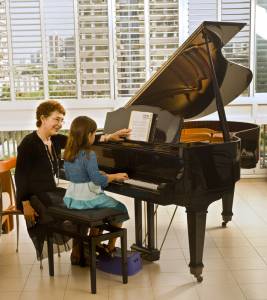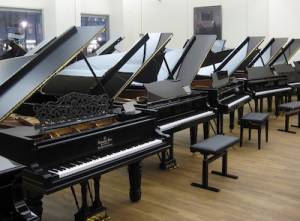I hope you are all very well and enjoying making wonderful music on all your pianos.
We have all spent a lot of time choosing the very best piano we can afford in the space we have and yet we never perform on it, or do gigs on it unless they are in the place we have our piano. I don’t know about you, but there is no way I could have a concert in my music room simply due to lack of space. As pianists we never perform on the instrument we are most familiar with. The instrument we spend all that time developing our technique and working out how to play our pieces is never the one on which we perform. All other instrumentalists would be horrified if they had to play on an instrument that wasn’t their own.
This thought ties in very nicely with a question I had from a young pupil this week who is taking an exam at the end of term. His question was simply ‘what will the piano be like?’ It is of course a question many of my more thoughtful pupils ask. The follow up questions are often, ‘is there a little trick/technique I can use to adjust to the piano?’ and more often ‘can I try the piano before my exam?’
If the answer is yes to the third question, then no problem. If the answer to the first question is that I don’t know, then what? One of my colleagues suggested, I think tongue-in-cheek, first have a little prayer and then just play.
This leads on nicely to exploring the answer to the second question. The first thing to realise is that the piano is as it is and we have to simply accept that it will never be a better instrument than it is. Next is to just play the way you play. Every piano is different and accepting the piano as it is can actually be quite calming.  From time to time we encounter a piano that is simply dreadful. I used to tour with a violinist and at one venue the piano was by a fair margin the worst piano I have had to play. The pedals had been adjusted so many times that any chance of subtlety with pedalling was impossible. It was an older piano with ivory keys, but many of the key tops were missing. What remained was sticky and uneven. The action was indescribably awful and irregular, however, on the upside it was mostly in tune. At this point it was tempting to be deflated and dread playing quite a complicated programme to what turned out to be quite a large audience. What took over was the challenge to make it sound better and give the audience something very good and enjoyable. In the end it turned out to be one of our most exciting, enjoyable and successful concerts. I am starting to wander off topic here, but the point remains we have to accept what is put in front of us and play.
From time to time we encounter a piano that is simply dreadful. I used to tour with a violinist and at one venue the piano was by a fair margin the worst piano I have had to play. The pedals had been adjusted so many times that any chance of subtlety with pedalling was impossible. It was an older piano with ivory keys, but many of the key tops were missing. What remained was sticky and uneven. The action was indescribably awful and irregular, however, on the upside it was mostly in tune. At this point it was tempting to be deflated and dread playing quite a complicated programme to what turned out to be quite a large audience. What took over was the challenge to make it sound better and give the audience something very good and enjoyable. In the end it turned out to be one of our most exciting, enjoyable and successful concerts. I am starting to wander off topic here, but the point remains we have to accept what is put in front of us and play.
 So, how to cope with the piano that has to be played right now without preparation? While it is important to practice on our own piano to really refine technique and pieces being learnt, do try out pieces on as many other pianos as possible from pianos that do not function particularly well right through to the best piano that can be found. Even the very best pianos can catch us by surprise. At least by having experience of playing many types of pianos it removes the stress of not knowing what a piano will feel or sound like as playing a variety of pianos will have become part of your normal practice routine.
So, how to cope with the piano that has to be played right now without preparation? While it is important to practice on our own piano to really refine technique and pieces being learnt, do try out pieces on as many other pianos as possible from pianos that do not function particularly well right through to the best piano that can be found. Even the very best pianos can catch us by surprise. At least by having experience of playing many types of pianos it removes the stress of not knowing what a piano will feel or sound like as playing a variety of pianos will have become part of your normal practice routine.
Do listen really carefully, your ears will help you get the very best out of the piano you are playing. Avoid forcing a desired tone out of the piano that can’t deliver what you are wanting. Through listening carefully and accepting the limitations of the instrument you will get the best out of the piano and still remain honest to your performance. Added to that, have in mind what sound you need according to the demands of the piece.  The piano as an instrument is just a tool and you have to be the master of your fingers in order to get the best out of the piano you are playing. Good quality practice is the key. Make sure there has been sufficient slow practice as this will help you to be in control of your fingers and to know every corner of the piece you are playing.
The piano as an instrument is just a tool and you have to be the master of your fingers in order to get the best out of the piano you are playing. Good quality practice is the key. Make sure there has been sufficient slow practice as this will help you to be in control of your fingers and to know every corner of the piece you are playing.
Just like people, every piano is different. Try not to worry about that unknown piano, play as many pianos as possible, listen carefully to the capabilities of the piano and make sure your practice has been thorough.
Enjoy playing and try out lots of pianos.



Add Comment